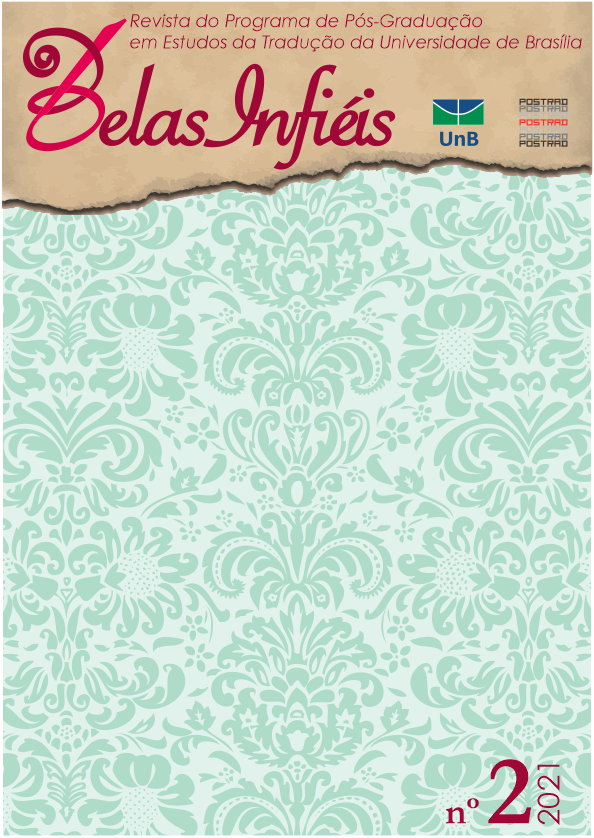Translation assessment in the professional and pedagogical settings: proposal of a teaching unit for peer review and assessment
DOI:
https://doi.org/10.26512/belasinfieis.v10.n2.2021.33824Keywords:
Translator education. Competence-based teaching (CBT). Assessment and revision parameters. DQF-MQM model. Error typology-based assessment.Abstract
Assessment in translation can be considered from at least three perspectives: assessment of published translations (translation criticism), assessment in translation teaching (pedagogical) and assessment of professionals at work (MARTÍNEZ MELIS; HURTADO ALBIR, 2001). In the pedagogical context, literature on translator education indicates the need to bridge the gap between translation training and professional practices (KELLY, 2005; KIRALY, 1995). With the aim of taking another step towards this connection, this paper brings elements from professional assessment of translation into the context of translation teaching by proposing a Teaching Unit (TU) in which methodologies and tools from DQF-MQM model are used as a basis for learning tasks, involving peer review and assessment (“co-assessment” according to Hurtado Albir, 2015a). The design of this teaching unit is in line with the theories of constructivist learning and Competence Based Teaching (CBT) (PACTE, 2017), with task-based teaching approach as its methodological cornerstone (HURTADO ALBIR, 2015a). The theoretical framework includes the conceptual base from CBT as well as assessment in CBT, and data related to the DQF-MQM assessment model, used for professional assessment in translation agencies. Procedures adopted to build the TU follow the parameters proposed by Hurtado Albir (1999, 2005), according to which the TU is built around translation tasks that constitute the organizational axis of learning. Research results indicate that CBT is an appropriate choice to promote the integration between the market sector chosen and the pedagogical environment, by bringing together the competencies required from professionals and those to be acquired in the pedagogical context. Results also indicate that the DQF-MQM model is a relevant choice to stablish a dialog between the professional setting and translation teaching due to the fact that this model offers (i) the possibility of adjusting error categories and quality levels to suit the pedagogical context; (ii) a category for positive points in the translation assessment; and (iii) information publicly available about the criteria, metrics and methods that constitute the model.
Downloads
References
BIGGS, J.; TANG, C. Teaching for Quality Learning at University. 4. ed. New York: Open University Press, 2011.
CHESTERMAN, A.; WAGNER, E. Can Theory Help Translators? Manchester: St. Jerome Publishing, 2002.
COSTA, P. R. A formação de tradutores em instituições de educação superior públicas brasileiras: uma análise documental. Tese (Doutorado) ”“ Universidade Federal de Santa Catarina, Centro de Comunicação e Expressão, Programa de Pós-Graduação em Estudos da Tradução, Florianópolis, 2018.
DELISLE, J. La traduction raisonnée. 3. ed. Ottawa: Les Presses de l’Université d’Ottawa, 2013.
DRUGAN, J. Quality in Professional Translation: Assessment and Improvement. London: Bloomsbury, 2013.
ESTAIRE, S.; ZANÓN, J. Planning Classwork. A Task Based Approach. Oxford: MacMillan Heinemann, 1994.
GALÁN-MAÑAS, A.; HURTADO ALBIR, A. Competence assessment procedures in translator training. The Interpreter and Translator Trainer, v. 9, n. 1, p. 63-82, 2015.
GYSEL, E. V. Competência tradutória e didática de tradução no contexto do curso de secretariado executivo. Tese (Doutorado) - Universidade Federal de Santa Catarina, Centro de Comunicação e Expressão, Programa de Pós-Graduação em Estudos da Tradução, Florianópolis, 2017. Disponível em:<http://www.bu.ufsc.br/teses/PGET0360-T.pdf>. Acesso em: 30 ago. 2020
HURTADO ALBIR, A. Enseñar a traducir. Madrid: Edelsa, 1999.
HURTADO ALBIR, A. A aquisição da competência tradutória: aspectos teóricos e didáticos. In: ALVES, F.; MAGALHÃES, C.; PAGANO, A. (Org.). Competência em tradução: cognição e discurso. Belo Horizonte: Editora UFMG, 2005. p. 19-57.
HURTADO ALBIR, A. Competence-based curriculum design for training translators. Interpreter and Translator Trainer, v. 1, n. 2, p. 163-195, 2007.
HURTADO ALBIR, A. Aprender a traducir del francés al español: competencias y tareas para la iniciación a la traducción (guía didáctica). Madrid: Edelsa, 2015a.
HURTADO ALBIR, A. The Acquisition of Translation Competence. Competences, Tasks, and Assessment in Translator Training. Meta: Journal des Traducteurs, v. 60, n. 2, p. 256, 2015b.
KELLY, D. A Handbook For Translator Trainers: A Guide to Reflective Practice. Manchester: St. Jerome, 2005.
KIRALY, D. Pathways to Translation: Pedagogy and Process. Kent: Kent State University Press, 1995
KIRALY, D. A social constructivist approach to translator education: empowerment from theory to practice. Manchester: St. Jerome, 2000.
MARTÃNEZ MELIS, N.; HURTADO ALBIR, A. Assessment In Translation Studies: Research Needs. Meta: Journal des Traducteurs, v. 46, n. 2, p. 272, 2001.
MORIN, K. H. et al. Translation technology and learner performance Professionally-oriented translation quality assessment with three translation technologies. In: JAKOBSEN, A. L.; MESA-LAO, B. (Ed.). Translation in transition: Between cognition, computing and technology. Amsterdam: John Benjamins, 2017. p. 207-234.
MOSSOP, B. Revising and Editing for Translators. 3. ed. New York: Routledge, 2014.
PACTE. Researching Translation Competence by PACTE Group. Amsterdam: John Benjamins, 2017.
PORTILHO, T. Avaliação de tradução nos contextos profissional e pedagógico: proposta de unidade didática para revisão e avaliação por pares. Dissertação (Mestrado)- Universidade Federal de Santa Catarina, Centro de Comunicação e Expressão, Programa de Pós-graduação em Estudos da Tradução, Florianópolis, 2019. Disponível em: <http://www.bu.ufsc.br/teses/PGET0442-D.pdf>. Acesso em: 30 ago. 2020.
SALDANHA, G.; O’BRIEN, S. Research Methodologies in Translation Studies. New York: Routledge, 2014.
SCALLON, G. Avaliação da aprendizagem numa abordagem por competências. Tradução de Juliana Vermelho Martins. Curitiba: PUCPress, 2015.
YANG, J. et al. Using Computer Assisted Translation tools’ Translation Quality Assessment functionalities to assess students’ translations. The Language Scholar Journal, n. 1, p. 1-17, 2017.
Downloads
Published
How to Cite
Issue
Section
License
Copyright (c) 2021 CC BY

This work is licensed under a Creative Commons Attribution 4.0 International License.
Given the public access to this journal, the texts are free to use but requires the recognition of the original authorship and initial publication in this journal to be properly stated.
 The journal allows the use of works published for non-commercial purposes, including the right to submit the work to publicly accessible databases. Published contributions are the sole and exclusive responsibility of the author(s).Â



















